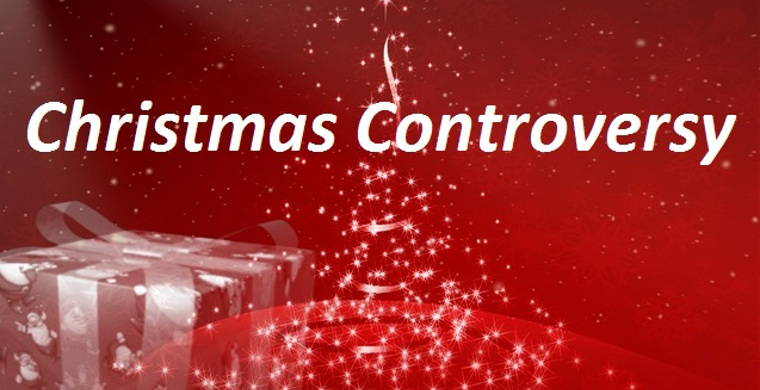Celebrating Christmas Controversies
By Mike McManus
December 18, 2014
On their first Christmas in the New World, the Puritans in Massachusetts did not celebrate the holiday at all. Instead, they worked in the fields. In fact, the colony actually outlawed the celebration of Christmas from 1659-1681. Anyone caught celebrating was fined five shillings.
Why? Early in the 17th century England, Christmas was celebrated much as it is today -- as a religious festival and an important holiday. During the 12 days of Christmas, churches and other buildings were decorated with rosemary, holly and ivy. Christmas Day church services were packed. Gifts were exchanged at New Year's and Christmas boxes were distributed to the poor.
Great quantities of roast beef, minced pies and Christmas ale were consumed. People enjoyed dancing, singing, and stage plays. This often led to drunkenness and promiscuity.
Puritans of 16th and 17th century were horrified. In the 1580s Philip Stubbes, author of the "Anatomie of Abuses," complained that there was "more mischief in that time committed than in all the year...robbery, whoredom and murder, and what is not committed? What dicing and carding, what eating and drinking, what banqueting and feasting is then used, more than all the year besides, to the great dishonour of God and impoverishing of the realm."
Puritans were motivated in part by their hatred of Catholicism -- what they called "popery." They also saw nothing in Scripture that celebrated Christmas and charged that December 25 was not the birthday of Jesus, but the date pagans celebrated the "winter solstice,"
Indeed, the pagan Scandinavian and Germanic people of northern Europe celebrated a 12-day winter solstice holiday in 900 AD called Yule beginning on December 25. Many modern Christmas traditions, such as the Christmas tree, the Christmas wreath, the Yule log are direct descendants of Yule customs.
Therefore, the first Christmas controversy was Christian-led and began when England was ruled by a Puritan Parliament. Puritans sought to remove elements they viewed as pagan (non-Biblical in origin). In 1647 the Puritan-led Parliament banned the celebration of Christmas. Incredibly, they replaced it with a day of fasting!
Puritans brought that mindset to America, disapproving Christmas so totally it was outlawed in Boston. The ban was revoked by English Governor Edmund Andros, but it was not until the mid-19th Century that celebrating Christmas became fashionable. By the Declaration of Independence in 1776, it was not widely celebrated in America. Christmas was not proclaimed a holiday by the U.S. Congress until 1870.
The Soviet Union and other Communist regimes banned overtly religious Christmas traditions. Most customs associated with Christmas such as decorated trees and presents were reinstated in Soviet society, but were tied to New Year's Day -- a tradition that remains.
More recent controversies, such as what Bill O'Reilly called the "War on Christmas," centered around the failure of businesses and schools to use the word "Christmas." The ACLU and Americans United for Separation of Church and State filed suits against government funded displays of manger scenes and even such secular elements as reindeer, snowmen and elves. In 2002 New York City public schools banned the display of Nativity scenes, but allowed Christmas trees and Hanukkah menorahs.
In 2005 Boston labeled its decorated tree a "holiday tree." Result: the Nova Scotian tree farmer who donated the tree said he would rather have put the tree in a wood chipper than have it called a "holiday tree." In 2005 the Michigan Senate debated whether its tree in front of the Capitol would continue to be called a "holiday tree," as it had been since the 1990s. Finally in 2007 it began to be called a Christmas tree.
The American Family Association criticized Target for its decision not to use the term "Christmas" in any of its stores, online or advertising. AFA initiated a nation-wide boycott of Target, generating 700,000 petition signatures. Within a week, Target began incorporating "Christmas" in advertising.
Lowes tried selling "Holiday trees" until AFA complained in 2005. Lowe's flip-flopped but its 2007 catalog contained references to "Family trees," which it said was an oversight.
On November 11, 2009 AFA called for a two-month boycott of Gap, Inc. over "the company's censorship of the word `Christmas.' A day later, Gap ran a campaign ad sung as "Go Christmas, Go Hanukkah, Go Kwanzaa...Go Christmas, go Hanukkah, go whatever holiday you Wannakuh." AFA refused to call off the boycott. On November 24, Gap announced a new TV
commercial for Thanksgiving with a "very strong Christmas theme." AFA ended the boycott.
AFA now praises Target and Gap as "Nice" but has Pet Smart, Stapes and Family Dollar on its "Naughty" list with 9 others.
Bravo for the AFA!
Michael J. McManus is President of Marriage Savers and a syndicated columnist














